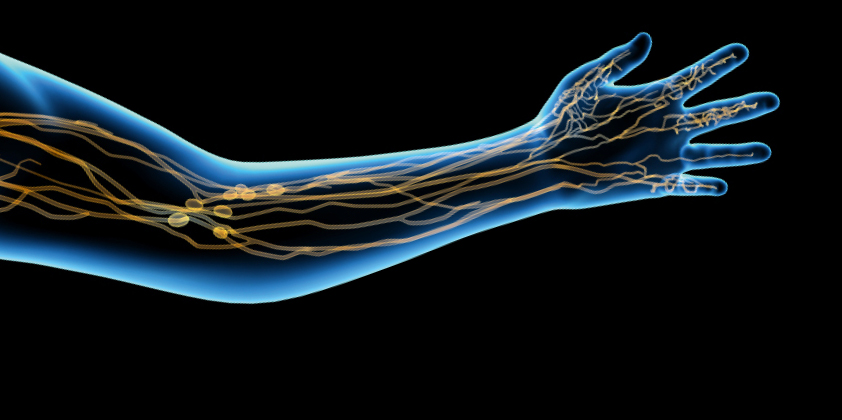Treating the inflammation in lymphedema
ETH researchers have discovered that certain cells in the immune system suppress the development of lymphedema. Anti-inflammatory therapies could therefore be the key to treating this previously incurable condition.

When the tissue fluid in our arms or legs can no longer drain properly, it begins to accumulate. The affected limbs swell and lymphedema develops. This frequently occurs following operations in which surgeons remove lymph nodes. For instance, around one fifth of all breast cancer patients develop lymphedema in the arm or breast region some years after surgery. This is distressing for the women affected – not only out of cosmetic concerns, but also because they can have difficulties moving their arm and are more prone to infection. It has not been possible to cure this condition until now, only to alleviate it somewhat through treatments such as lymphatic massage.
Why some patients develop lymphedema and others do not is not clear. There are, however, indications that while surgery plays a certain role in the onset of lymphedema, inflammatory processes in the body are also involved.
The immune system's regulatory cells
A team of researchers from ETH Zurich and Aristotle University of Thessaloniki have now discovered that a specific subset of blood cells – the regulatory T cells – can suppress lymphedema. This finding could help develop therapies to cure lymphedema.
Regulatory T cells are part of a finely balanced immune system. They suppress immune responses, as a counterpart to other blood cells which encourage immune responses. In doing so, regulatory T cells ensure that immune responses do not overshoot the target.
Cell transfusion helps
The researchers, led by ETH Professor Michael Detmar, uncovered the connection between regulatory T cells and lymphedema when they were measuring the concentration of various RNA molecules in the lymphedema tissue of mice. They found particularly high concentrations of molecules that control the gene activity in regulatory T cells. The researchers therefore concluded that such cells are more active in lymphedema tissue. In subsequent cell biology investigations of both mouse tissue and biopsies of patients, the researchers were also able to corroborate this cell type directly.
In further experiments on mice, Detmar and his colleagues were able to clarify the role of regulatory T cells in lymphedema: the cells inhibit the growth of the edemas. Animals lacking the regulatory T cells developed more severe lymphedema. Conversely, mice exhibited significantly less swelling when the researchers increased the number of regulatory T cells in them beforehand.
The scientists carried out two types of experiments: in one, they activated the regulatory T cells by administering particular substances that substantially increased their number. In the other, the scientists gave the mice a transfusion of regulatory T cells.
Focus on inflammation
“Our work shows that you can keep lymphedema in check by suppressing inflammation,” says ETH professor Detmar. Until now, the medical field has focused on the lymphatic vessels and the draining of lymphatic fluid when treating lymphedema. “Our study suggests a paradigm shift. When treating lymphedema, you should focus instead on inflammatory responses. It is likely that this approach would make a cure for lymphedema possible for the first time.”
It would be useful to consider a therapy with anti-inflammatory drugs, says Detmar. In the future, a transfusion of regulatory T cells might also be possible in humans. “This is already being done in the context of clinical trials for other diseases: for complications after organ transplants and for certain autoimmune diseases,” says Epameinondas Gousopoulos, a physician and doctoral student of natural sciences in Detmar's group. However, as the researchers point out, it is necessary to keep in mind with cancer patients that measures which suppress immune responses could also promote tumor growth. It would be necessary to find the right balance.
Reference
Gousopoulos E, Proulx ST, Bachmann SB, Scholl J, Dionyssiou D, Demiri E, Halin C, Dieterich LC, Detmar M: Regulatory T cell transfer ameliorates lymphedema and promotes lymphatic vessel function, JCI Insight 2016, 1: e89081, doi: external page10.1172/jci.insight.89081call_made
